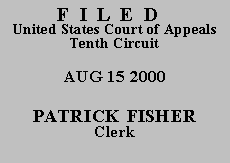

| UNITED STATES OF AMERICA, |
|
| v. | |
| ERYCK C. ASTON, |
In addition to and separate from several other motions and appeals for relief, Mr. Aston filed a motion for return of property pursuant to Rule 41(e) of the Federal Rules of Criminal Procedure, including all weapons that were seized pursuant to a search warrant and that were the basis of the indictment's charges. An evidentiary hearing was held on the Rule 41(e) motion in October 1999, and in January 2000, the district court denied Mr. Aston's motion for return of property as it related to firearms and explosives. Mr. Aston, proceeding pro se, now appeals.
We review the district court's denial of a Rule 41(e) motion for return of property for an abuse of discretion. See United States v. Deninno, 103 F.3d 82, 84 (10th Cir. 1996). Under Rule 41(e), one who has been deprived of her property may move "for the return of the property on the ground that such person is entitled to lawful possession of the property." Fed. R. Crim. P. 41(e). The district court reasoned, and we agree, that Mr Aston, as a convicted felon, was not lawfully entitled to possess the firearm, either actually or constructively under 18 U.S.C. § 922(g)(1).
Mr. Aston also contends that his right to due process was violated because he was denied a fair hearing as to the forfeiture of the firearms. Contrary to his assertion, the court held an extensive hearing and allowed for return of most of Mr. Aston's belongings, with the exception of the firearms, to which he was not entitled. Similarly, we reject Mr. Aston's contention that the forfeiture of the firearms violated the double jeopardy clause, pursuant to the Supreme Court's decision in United States v. Ursery, 518 U.S. 267 (1996). "In Ursery, the Supreme Court held that civil forfeiture does not constitute punishment for the purposes of the Fifth Amendment's prohibition on double jeopardy." Deninno, 103 F.3d at 87; see Ursery, 518 U.S. at 292.
For the reasons stated above we AFFIRM the district court's dismissal of Mr. Aston's motion under Fed. R. Cr. P. 41(e).
Entered for the Court,
Robert H. Henry
Circuit Judge
*. This order and judgment is not binding precedent, except under the doctrines of law of the case, res judicata, and collateral estoppel. The court generally disfavors the citation of orders and judgments; nevertheless, an order and judgment may be cited under the terms and conditions of 10th Cir. R. 36.3.
**. After examining the briefs and appellate record, this panel has determined unanimously that oral argument would not materially assist the determination of this appeal. See Fed. R. App. P. 34(a)(2); 10th Cir. R. 34.1(G). The case is, therefore, ordered submitted without oral argument.